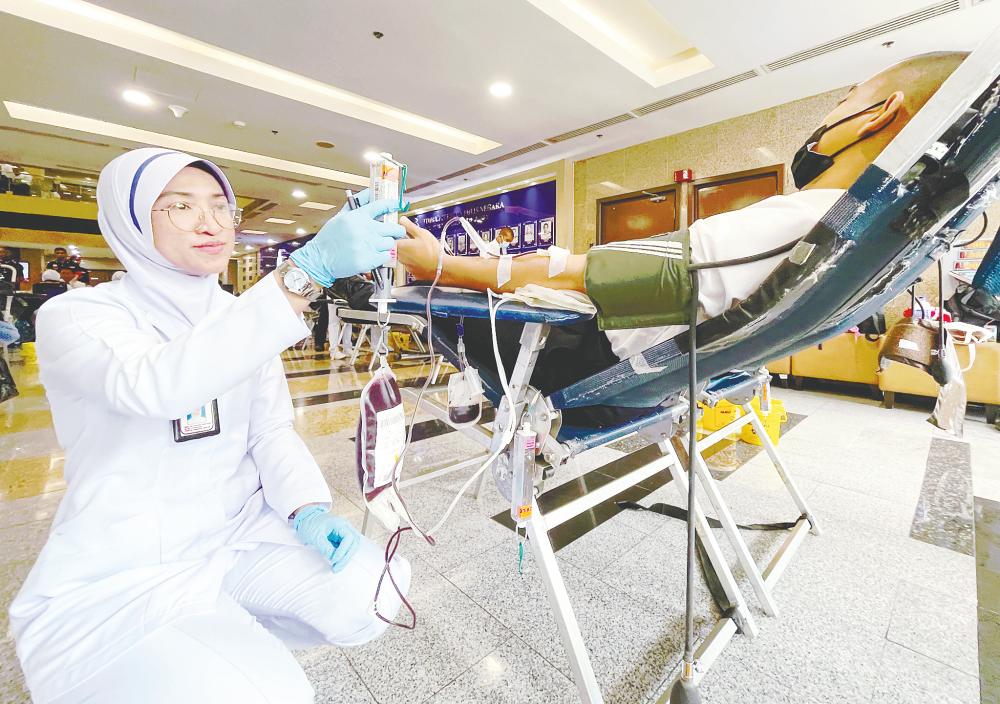PETALING JAYA: A lack of awareness about one’s blood type is emerging as a critical issue in the country, with a haematologist warning of potential risks during emergencies and life-saving procedures.
Universiti Putra Malaysia Sultan Abdul Aziz Shah Hospital Internal Medicine and Haemotologist senior consultant Assoc Prof Dr Bahariah Khalid said despite its importance, many Malaysians remain unaware of their blood type, which can lead to significant challenges during medical emergencies and patient blood management.
She said understanding blood type is vital, as it plays a critical role in patient blood management guidelines, particularly in cases of blood loss, regardless of the cause.
“The lack of awareness among Malaysians about their blood type is primarily attributed to existing medical practices, in which blood typing is not a routine procedure in clinics or hospital wards unless there is a specific need for a blood transfusion.”
Bahariah said blood transfusions are required to be as compatible as possible with the patient’s blood type or group in order to prevent the side effects of transfusion-related reactions.
She said the indications for blood typing or grouping are largely for blood donation campaigns, during which donors are classified for auditing purposes and proper patient blood management practices.
“Blood typing is also crucial to identify suitable donors because blood banks sometimes announce shortages of specific blood types through direct communication or the mass media.
“Individuals with matching blood types can step forward to donate, provided they meet the eligibility criteria,” she said.
Health Ministry Medical Development Division director Datuk Dr Mohd Azman Yacob said on average, the National Blood Centre requires 15,000 to 17,000 bags of blood each month to meet the needs of over 80 government and private hospitals in the Klang Valley.
Additionally, to treat 1,000 patients nationwide, an average of 2,000 to 2,200 bags of blood are needed daily.
According to the Health Ministry portal, as of December 2024, 42.1% of Malaysians have blood type O, while blood type A accounts for 25.4%, blood type B accounts for 26.8% and AB makes up 5.7%.
Bahariah said it is also important to note that alongside blood grouping, testing is also conducted to screen for harmful viruses, such as Hepatitis B and C, and retroviral infections, which include HIV and venereal diseases.
“Before a blood transfusion for patients whose blood type is unknown, the most compatible donor red cells are used to ensure safety to prevent the potentially fatal consequences of receiving the wrong blood type,” she said.
Bahariah stressed that the potential risks in emergencies when a person’s blood type is unknown are severe and life-threatening, and that transfusing blood without knowing the recipient’s type is never practised, as it can result in fatal outcomes.
“In emergencies, dealing with an unknown blood type is a nightmare. Besides, the antigen-antibody can react, causing clumping of the blood in vessels and vital organs, and leading to multi-organ failure and death.
“In the long run, the patient’s body can start producing antibodies that attack the antigens on the donor blood cells that were incompatible, causing reaction and rejection, causing red blood cell destruction.”
Bahariah said to address the lack of awareness, incorporating blood typing as part of routine health checks on individuals’ 12th birthdays, and printing the information on their identification cards should be considered.
She urged hospitals, blood banks and the government to bridge the knowledge gap through expanded media campaigns, particularly on social media platforms, to reach the younger population.
“It is good to know your blood type, especially in emergencies, as it can help save your life or those of others, particularly if you have a rare type.”









